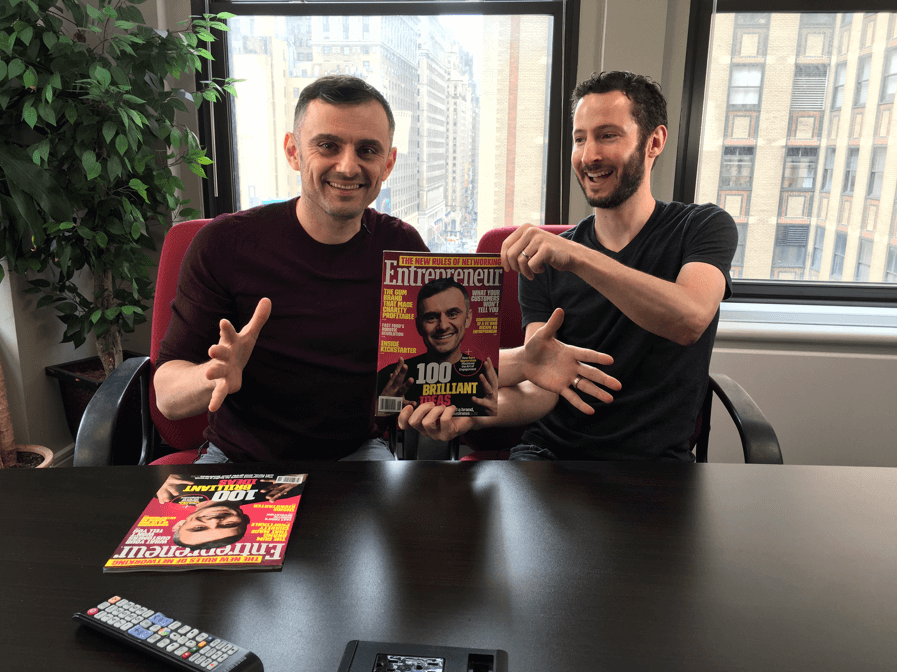“If you get into entrepreneurism you have to accept it’s a long hard road and nothing comes easy.”
Those words come from Jason Feifer, the Editor-in-Chief of Entrepreneur Magazine, who gets a front row seat to the dedication and, at times, disappointment that go into making a successful business.
He shared his thoughts with us on why now is a great time to be an entrepreneur, lessons he’s learned from people living this lifestyle, and what it takes to succeed when building a company.
Feifer rose to his current role a year ago after joining Entrepreneur Magazine in 2015, following stints at Men’s Health, Fast Company and Maxim magazine. He worked his way from writing local community news to sitting at the helm of a major magazine; a path that included disappointment – like many an entrepreneur.
While working for a small community paper in Gardner, Massachusetts, the south Florida raised Feifer says he had a vision of himself working on big things for a big audience and that it was somewhat soul–crushing to work on a smaller scale. But he used that time to hone his writing and learn how to be a stronger reporter.
“You need to balance impatience with patience,” he says. “It’s good to want big things and to want to move there fast. But you also have to be patient and know that you don’t just get there one day because you think you deserve it. You have to work for it.”
Working hard and being patient is advice any budding entrepreneur can use.
In a time where innovative companies that make our lives easier seemingly pop up overnight, it can be easy to forget that most people who have made it big have spent long hours building their product in anonymity.
While Feifer says overnight successes occasionally happen, it’s not the norm.
“More often than not if you talk to the people who have what seems like an overnight success, they would call it an overnight success ten years in the making,” Feifer says.
One example of that is Brian Kelly, better known as the Points Guy, who’s website offers travel and credit card tips.
Kelly was a recent guest on Entrepreneur Magazine’s podcast that’s hosted by Feifer.
In the podcast, Feifer shares how Kelly’s business went through several iterations before becoming the behemoth it is today. Kelly was willing to adapt and change each time his current business model no longer worked. Now, he’s number one on Forbes’ list of top Travel Influencers and his website reaches over 4 million people monthly.
“A successful entrepreneur is someone who embraces change,” says Feifer.
ONE-SIZE NO LONGER FITS ALL
When Feifer took over the Editor-in-Chief role, one of his first big challenges was coming up with a new vision for the magazine and brand.
He had to figure out a way to speak to a diverse group of people who identify as entrepreneurs in a way that is relevant to all of them: “We can’t talk to them like they all need tax tips for small businesses because that’s just not relevant to them,” Feifer says.
That’s because entrepreneurs today don’t come in one-size fits all packages. They don’t all go to business school or live in Silicon Valley or wear hoodies and sneakers to work.
What is relevant to every entrepreneur, according to Feifer; from those selling things on eBay to those running a venture-backed company, is the experience of entrepreneurism.
“{It’s the experience of} feeling lonely and crazy and problem-solving your way through walls and all that stuff. And no matter the career you’re in, you can appreciate when someone does that really well.”
Feifer used that notion for the new direction of the magazine: it would appeal to the boom of entrepreneurs of all shapes and sizes—it’d be about problem-solving, smart thinking and the emotional challenges of this lifestyle.
THE GOLDEN AGE OF ENTREPRENEURISM?
While Feifer hesitates to say there’s a Golden Age of anything, he does say we’re in a very exciting place and it’s never been easier to be an entrepreneur, thanks to the ample tools available to help people run businesses. Feifer also credits the peer group and success stories as helping push along the entrepreneurial boom.
“The stories create a culture in which we all feel comfortable knowing this is a true line of work; this is something you can actually do,” he says. “You can quit your job and start a company and it can be successful. Doesn’t mean it will be successful, but it could be.”
Of course for all the ways in which now is a great time to be an entrepreneur, there are challenges.
A crowded marketplace is one: with so many people launching products and businesses, some are bound to overlap. Feifer says while its never been easier to reach people thanks to the internet and social media, it’s also harder to cut through the noise as a business. He adds that entrepreneurs have to be constantly looking forward since there’s so much competition.
“The minute you stand still or rest on your accomplishments it’s a minute that someone comes and passes you,” he says.
LESSONS LEARNED: SOMETIMES YOU ARE NOT THE STORY
Feifer is constantly learning from successful entrepreneurs he interviews or meets.
One such lesson recently came from Sam Calagione, the founder of Dogfish Head Brewery. A number of years ago the brewery introduced a beer called 60 Minute IPA, it was an instant hit and became the brewery’s most popular beer, threatening to take over all of the company’s sales. Feifer says that Calagione was pleased, but didn’t want it to squash out his other products since he wanted to be known as an innovator. So Calagione decided 60 Minute IPA would never account for more than 50{cd266c1509fca34f59dc93da7daf12a6ee52c6401aabb2126e757d9de7c223fc} of his company’s sales. That meant saying no to bars and distributors when they asked for more product and it meant upsetting some people in the short-term. But, Feifer says, Calagione’s long-term vision and plan paid off as Dogfish remains a huge craft brewer and is widely recognized as an innovative brewery.
Another story Feifer mentions is a pitch he once got from Fred Ruckel, the inventor of a cat toy called the Ripple Rug. The Ripple Rug wasn’t a fit for the magazine, but Ruckel also told Feifer about something happening in the world of ecommerce called Amazon-to-eBay arbitrage. People were buying items, like the Ripple Rug, on Amazon and then reselling them on eBay at a higher cost, pocketing the difference. Feifer wound up writing a feature on this internet scheme that was happening to Ruckel and his product, and the story blew up online. The lesson here, says Feifer, is that sometimes an entrepreneur is part of a trend or something about their business fits into a broader story, but they are not the story.
HOW TO SUCCEED IN BUSINESS
There is no one blueprint or method of success when it comes to being an entrepreneur. Each successful business owner has his or her own path and their own challenges they met along the way.
And those challenges — and failures too — are not only learning tools, but they can be something that sets you apart.
“The greatest failure of anybody who pitches me {a story} is that they only tell me about their success,” Feifer says. “Whereas the stories that I really bite on are the stories where they tell me about how they solved a problem.”
As for solving problems– Feifer thinks the current boom in entrepreneurs came about as a result of the economy crashing a decade ago.
“That was a point in which a generation of people learned they’re not protected by any one career or company,” he says.
As people watched their friends or parents lose their jobs, he adds, they realized they needed to diversify their skill set and rely upon themselves. So many people were looking for control.
In addition, the stories we hear all the time of people who took a chance and made it big serve as a huge source of inspiration. Whether that inspiration ignites a spark in someone to quit their job and start their own company or just inspires them to do something creative on the side: the liberating feeling is there.
And that’s the really cool thing about this entrepreneurial age we’re living in: it is a career for so many, but it can also be a state of mind or simply an attitude.
As Fiefer says, “The spirit of entrepreneurism and people feeling like they can take control of their lives is something I hope filters into everybody.”

